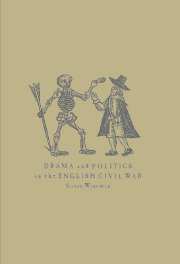Book contents
- Frontmatter
- Contents
- List of illustrations
- A note on texts and list of abbreviations
- Acknowledgements
- Preface
- Introduction: how the drama disappeared
- PART I 1642–1649: CASES IN POLITICS AND DRAMA
- Interchapter: ‘The life of action’: playing, action and discourse on performance in the 1640s
- PART II THE 1650S: PROTECTORATE, POLITICS AND PERFORMANCE
- 4 Gender and status in dramatic discourse: Margaret Cavendish, Duchess of Newcastle
- 5 Royal or reformed? The politics of court entertainment in translation and performance
- 6 National identity, topic and genre in Davenant's Protectorate opera
- 7 Genre, politics and place: the social body in the dramatic career of John Tatham
- 8 True and loyal? Politics and genre in Civil War and Protectorate tragicomedy
- Coda
- Notes
- Select bibliography
- Index
6 - National identity, topic and genre in Davenant's Protectorate opera
Published online by Cambridge University Press: 20 August 2009
- Frontmatter
- Contents
- List of illustrations
- A note on texts and list of abbreviations
- Acknowledgements
- Preface
- Introduction: how the drama disappeared
- PART I 1642–1649: CASES IN POLITICS AND DRAMA
- Interchapter: ‘The life of action’: playing, action and discourse on performance in the 1640s
- PART II THE 1650S: PROTECTORATE, POLITICS AND PERFORMANCE
- 4 Gender and status in dramatic discourse: Margaret Cavendish, Duchess of Newcastle
- 5 Royal or reformed? The politics of court entertainment in translation and performance
- 6 National identity, topic and genre in Davenant's Protectorate opera
- 7 Genre, politics and place: the social body in the dramatic career of John Tatham
- 8 True and loyal? Politics and genre in Civil War and Protectorate tragicomedy
- Coda
- Notes
- Select bibliography
- Index
Summary
Why, truly, your great enemy is the Spaniard. He is. He is a natural enemy, he is naturally so. He is naturally so, throughout, as I said before … And truly when I say that he is naturally throughout an enemy, an enmity is put into him by God.
Oliver Cromwell, Speech at the opening of parliament, 17 September 1656Sir William Davenant was the only professional dramatist permitted to stage plays commercially and publicly in the entire period 1642–60. His Protectorate plays and operas came into existence at the border between government policy and commercial success (which was dependent upon the audience's pleasure). Therefore this chapter, in examining the circumstances of these performed plays, is a study in contradictions. It continues the work of chapter 5 in analysing the politics of opera as a genre, but extends its focus to discuss the politics of the kind of narrative which Davenant was staging, and to provide cultural and political contexts for his plays.
Prevailing critical assumptions about Davenant's theatre staged between 1656 and 1659 are based on the work of Harbage, and Nethercot's characterisation of Davenant's Protectorate drama as participating fairly completely in a ‘royalist’ ideology. Even his most recent biographer, Mary Edmond, seems to see Davenant as a kind of royalist undercover agent attempting to restore the theatre.
- Type
- Chapter
- Information
- Drama and Politics in the English Civil War , pp. 137 - 164Publisher: Cambridge University PressPrint publication year: 1998



